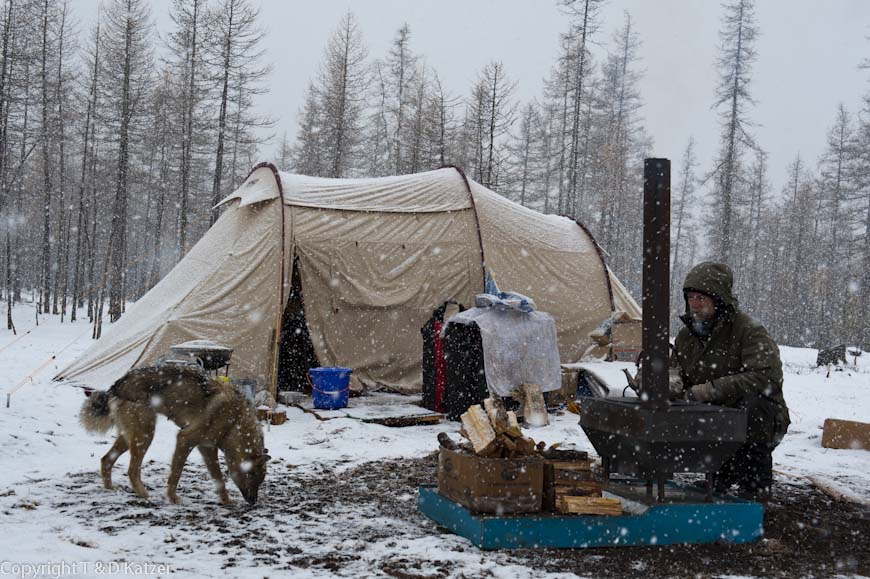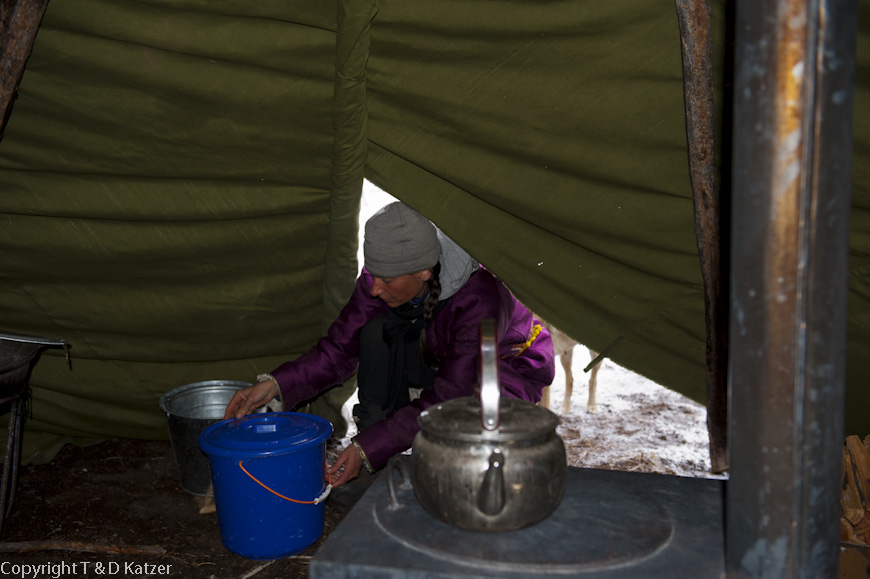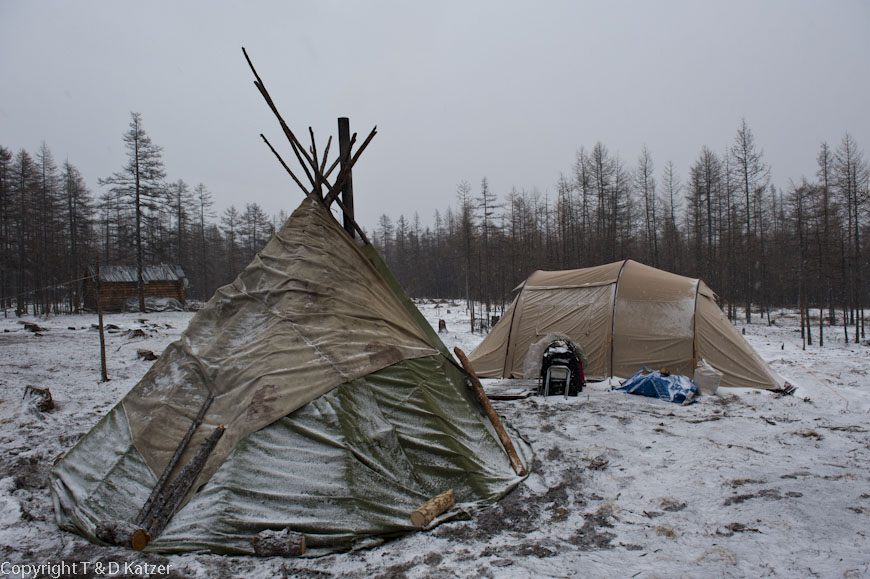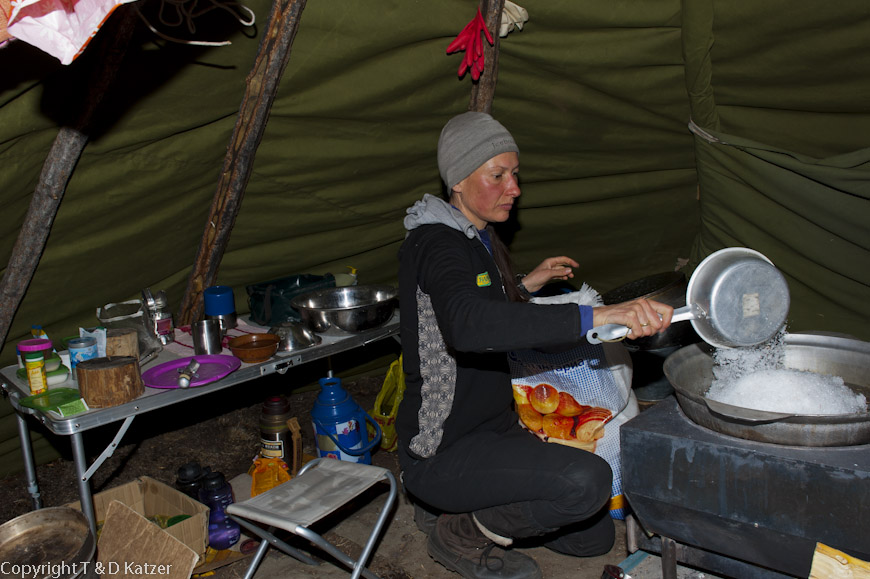
Moving into the tipi – One million
N 51°33'337'' E 099°15'341''
Day: 267
Sunrise:
06:24
Sunset:
20:21
Total kilometers:
1341
Soil condition:
Ice, snow
Temperature – Day (maximum):
8°C
Temperature – day (minimum):
minus 5°C
Temperature – Night:
minus 15°C
Latitude:
51°33’337”
Longitude:
099°15’341”
Maximum height:
1981 m above sea level






Heavy snowflakes rustle on our tent. I open my eyes and long for our yurt. “I’m not getting up until you’ve made a fire,” mumbles Tanja. “No stove, no fire. It’s amazing what a luxury a yurt is compared to a tent,” I reply. “Yes, it was a small palace. Will the Tuwa set off in the driving snow?” asks Tanja. “Hm, I have no idea. The best thing to do is ask.” “You mean you’ll ask,” says Tanja. “Yes, yes, I’ll ask. Sometimes it’s really stupid to be a man,” I reply grumpily, slipping out of my downer shell.
“And what’s the plan? Are we going to leave or stay?” I ask Tsaya and Ultsan half an hour later. “We first have to get our horses from the shepherds who have been looking after them all winter. But with this snowfall, the men won’t go. We’ll wait for better weather. Besides, Gamba has changed his mind. He’s not taking the jeep to the spring camp after all, but is leaving from here. He’ll be here this afternoon. Ultsan uses the time to ride a reindeer in the direction of Tsagaan Nuur. He is picked up halfway by a jade trader on a motorcycle. If we’re lucky, he’ll be able to sell 20 kilos,” I hear the extensive explanation for the further postponement of the departure. “Why, if we’re lucky?” I ask. “The dealer wants to cut the stone with his machine to check whether the jade is of good quality. If it’s as nice and green on the inside as it is on the outside, we’ll get a good price. Because Ultsan doesn’t trust him, he has to go with us to Tsagaan Nuur and watch his stone being cut,” she explains. “Good luck then,” I reply, not knowing whether to be happy or disappointed. But as I don’t feel like packing all our belongings in this awful weather either, I’m relieved moments later and head back into our cold tent. “The weather is too bad to get the horses,” I tell Tanja. “Well, I’ll just lie here for a while,” he mumbles quietly.
Although Tsaya has offered to let us spend the night and cook in her baishin, we prefer to be independent. That’s why I drag our beautiful stove, which we gave to Tsaya and Ultsan so that they could help us move and we could live in their spare tipi for a while, back outside our tent and light a fire in it. My work gloves are quickly soaked. Freezing, I put our kettle on the hob and warm myself with the heat that the little oil wastes into the snowy sky. Then I cut up some meat and make some soup. When the water boils, I pour it into our large thermos flask and carry it into the tent. Tanja has got up in the meantime. We sit in our camp chairs, eat a few dry cookies and drink hot tea.
One million
In the late afternoon, Ultsan and Ovogdorj arrive on their reindeer. Both are drunk, which is normal for the Tuwa when they visit the village. No matter the reason and no matter whether for a few hours or days. They are almost one hundred percent certain to come back drunk. Ultsan could not sell his jade stone as it turned out to be a poor quality stone. Tsaya is angry with her husband. Obviously because he was drinking again. This causes the house to go awry for a few hours. “And why couldn’t he sell the jade at a lower price?” I ask. “The dealer only wanted top quality,” explains Tsaya. “So Ultsan went to Tsagaan Nuur for nothing?” “Yes. By the way, we’re not moving tomorrow either.” “What, why not?” “Firstly, Ultsan couldn’t get the horses today and secondly, Buyantogtoh, Saintsetseg and everyone else aged 55 or over have to go to Tsagaan Nuur.” “Why?” “The state pays every disabled person and people aged 55 and over a million.” “That’s fantastic. And why does the state do that?” I ask. “It has to do with the gold mining rights that the Mongolian state sold to a foreign company. As far as I know, the company has committed itself to this levy, among other things. So now we have millionaires in the camp,” she laughs. “Yes, Tugrik millionaires. But when you consider that your average income is around 188,000 Tugrik (€107), that’s a considerable amount of money.” “Oh yes. I wish we could get that allowance too. Then we’d have a few less worries.” “I believe you. But be glad you’re not 55 yet.” “Ha, ha, ha. I am. But something else. You must be freezing in your tent.” “It’s cold, yes.” “Should Ultsan put up a tepee for you? Who knows how long it will take for the weather to improve?” “Oh, that would be great,” I reply, pleased at the suggestion. Ultsan walks out of the baishin with me, grabs 12 thin tree trunks lying behind his log cabin, ties three of them together at the upper end, erects them like a tripod over our stove and places the other nine on top using a special technique. Then he and his brother Hoo tie two lengths of tent around the outside and the tipi is ready. The whole operation took no longer than 15 minutes. “Wow. That was quick. Tschin setgeleesee bajrlalaa,” (Thank you very much) I say and carry our folding table, a folding chair and a few boxes out of the tent into the tipi with Tanja. “We’ll live here during the day and sleep in the tent over there at night,” I say. “A good idea,” replies Tanja.
The heat radiated by our stove is kept in the tipi for a short time before it escapes through the cheap, thin tent canvas. Even though it is quite uncomfortable here compared to a yurt, we are happy to be able to sit by a fire to keep warm. “It’s just a temporary solution,” Tsaya said. That’s why we don’t have a wooden floor like the Tuwa or low beds. The cold wind also whistles through the flapping canvas on the ground, so that we are freezing here too. “I’ll take care of the holes,” I say, stepping through the small entrance without a door into the drifting snow. Outside, I look for sawn-off wooden stakes, place them on the tracks and shovel snow onto them with my foot. “No more wind whistling in now,” I say as I go back into the dark tent. “Very good. It’s much better. It would be great if Ultsan could build us a door,” says Tanja. “I’ll go over and ask,” I reply. A little later, there is another canvas tent in front of our entrance which we can now open and close. It’s also a temporary solution, but it’s enough for the short time we’re still here.
Tanja starts cooking on the stove while I try to type a few notes into the computer. But as I’m about to run out of juice, I attach my solar panel to the outside of the tipi and run the cable to the car battery that I’ve placed next to my chair. “Now we have electricity again,” I say with satisfaction. “Does the solar panel give off energy in this bad weather?” wonders Tanja. “Not much. But it should be enough for now.”
We are enjoying Tanja’s lentil stew when Mogi suddenly appears. “Mogi! What are you doing here?” we ask. He answers wagging his tail. “Bilgee seems to have untied him to give him a run and the shameless guy took advantage. I’ll bring him back. He needs a guard dog,” says Tanja. “I don’t know if it’s a good idea to trudge through the taiga at night,” I reply. “Oh no. That’s no problem,” Tanja replies and puts on her Deel to take our dog to the Bilgee camp. “Take care of yourself,” I say and let Tanja go. Only half an hour later, I blame myself for not having accompanied her. “What if she does get lost? After all, it’s minus 13 °C and the forest looks like an ocean or a desert at night. Everything is the same,” it goes through my head. After an hour I’m seriously worried and about to get ready for a night march when Tanja finally turns up accompanied by Bilgee. “Man, you can be scary,” I say. “Why?” “Well, you were gone for an hour in the cold. And without a GPS. When everything looks the same,” I reply. “Bilgee also asked me whether I’d been drinking vodka or beer. He said you belong in a tent, yurt or tipi at night, but under no circumstances in the forest. He really scolded me.” “He’s right about that too. We could have brought Mogi back tomorrow.” “Okay, okay, you were both right. The forest can teach you respect. When we were walking to Bilgee Camp, I really had to stop and concentrate on which way his tent was facing. But we are there now and nothing has happened. So please don’t blame me.” “Hm, all right. Now warm yourself up before we go into the cold tent,” I say conciliatory.
We look forward to your comments!

